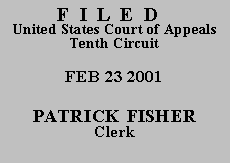 UNITED STATES COURT OF APPEALS
UNITED STATES COURT OF APPEALS
 UNITED STATES COURT OF APPEALS
UNITED STATES COURT OF APPEALS
TENTH CIRCUIT
| DAVID A. DANIEL, | |
| v. | No. 00-6234 |
| H.N. SONNY SCOTT, | (D.C. No. CIV-99-771-C) |
ORDER AND JUDGMENT(*)
Before HENRY, BALDOCK, and LUCERO, Circuit Judges.(2)
Petitioner David A. Daniel, proceeding pro se, filed a petition for writ of habeas corpus under 28 U.S.C. § 2254. The district court denied the petition and denied Petitioner's application for a certificate of appealability. Now before us is Petitioner's renewed motion. We deny Petitioner's application for a certificate of appealability as well and dismiss his appeal.
A jury convicted Petitioner in Oklahoma state court of one count of possession of methamphetamine, one count of possession of marijuana, and one count of possession of drug paraphernalia, in violation of Okla. Stat. tit. 63, §§ 2-402 and 2-405. Petitioner was sentenced to twenty years imprisonment on count one, two years imprisonment on count two, and fined $500 on count three. Petitioner appealed his convictions to the Oklahoma Court of Criminal Appeals (OCCA). The OCCA affirmed the judgment and sentences of the state district court. Petitioner then filed an application for post-conviction relief on numerous grounds. The state court denied the motion.
After exhausting his state remedies, Petitioner filed a petition for writ of habeas corpus under 28 U.S.C. § 2254. In the § 2254 petition, Petitioner claims (1) his appellate counsel was ineffective in failing to raise issues two, three, four, five, and six below, (2) the initial traffic stop, arrest, and seizure violated his Fourth Amendment rights, (3) he was denied effective assistance of counsel at trial, (4) the prosecution failed to disclose exculpatory evidence in violation of Brady v. Maryland, 373 U.S. 83 (1963), (5) he was denied a speedy trial in violation of his Sixth Amendment rights, (6) he was denied a fair trial in that the jury was not impartial, (7) he was denied a fair trial due to prosecutorial misconduct when the prosecutor placed facts not in evidence before the jury, (8) his convictions violated the Double Jeopardy Clause, (9) there was insufficient evidence to support his convictions, and (10) the district court erred in not conducting an evidentiary hearing on the claims.
The state district court held that claims two through six above were procedurally barred because they were not raised on direct appeal. The magistrate judge, however, concluded that the claims must be considered on the merits to determine whether Petitioner is entitled to habeas relief on his ineffective assistance of appellate counsel claim. After reviewing each claim, the magistrate judge concluded that none of these claims presented an issue which would probably result in a reversal on appeal. See Banks v. Reynolds, 54 F.3d 1508, 1515 (10th Cir. 1995). Therefore, the magistrate judge ultimately concluded counsel's failure to raise these issues does not constitute ineffective assistance of counsel.
The magistrate judge concluded that the prosecutor asked improper questions that were clearly prejudicial to the defense. The magistrate judge further concluded that the trial court took no measures to correct the improprieties other than to sustain defense counsel's objections. The magistrate judge concluded, however, that in light of the entire record, the jury did not render a conviction on grounds beyond the admissible evidence presented. See United States v. Dickey, 736 F.2d 571, 596 (10th Cir. 1984). In addition, the magistrate judge deferred to the OCCA's decision holding that Petitioner's convictions did not constitute double jeopardy because the drugs were not part of a single cache but were found in different places at different times. The magistrate judge further concluded that sufficient evidence supported Petitioner's convictions. Finally, the magistrate judge concluded that no evidentiary hearing was necessary.
The district court adopted the magistrate judge's report and recommendation, denied the § 2254 petition, and denied Petitioner's request for a certificate of appealability. A petitioner may appeal the denial of a § 2554 petition only if "a circuit justice or judge" issues a certificate of appealability. 28 U.S.C. § 2253(c)(1)(A). A certificate of appealability "may issue. . . only if the applicant has made a substantial showing of the denial of a constitutional right." Id. § 2253(c)(2). We have thoroughly reviewed Petitioner's application for a certificate of appealability, his brief, the magistrate judge's findings and recommended disposition, and the entire record before us. We conclude Petitioner has failed to make a showing of the denial of a constitutional right for substantially the same reasons stated in the magistrate judge's report and recommendation. Accordingly, we deny Petitioner's request for a certificate of appealability and dismiss the appeal.
CERTIFICATE OF APPEALABILITY DENIED; APPEAL DISMISSED.
Entered for the Court,
Bobby R. Baldock
Circuit Judge
*. This order and judgment is not binding precedent, except under the doctrines of law of the case, res judicata, and collateral estoppel. The court generally disfavors the citation of orders and judgments; nevertheless, an order and judgment may be cited under the terms and conditions of 10th Cir. R. 36.3.
2. After examining the briefs and appellate record, this panel has determined unanimously that oral argument would not materially assist the determination of this appeal. See Fed. R. App. P. 34(a); 10th Cir. R. 34.1(G). The case therefore is ordered submitted without oral argument.